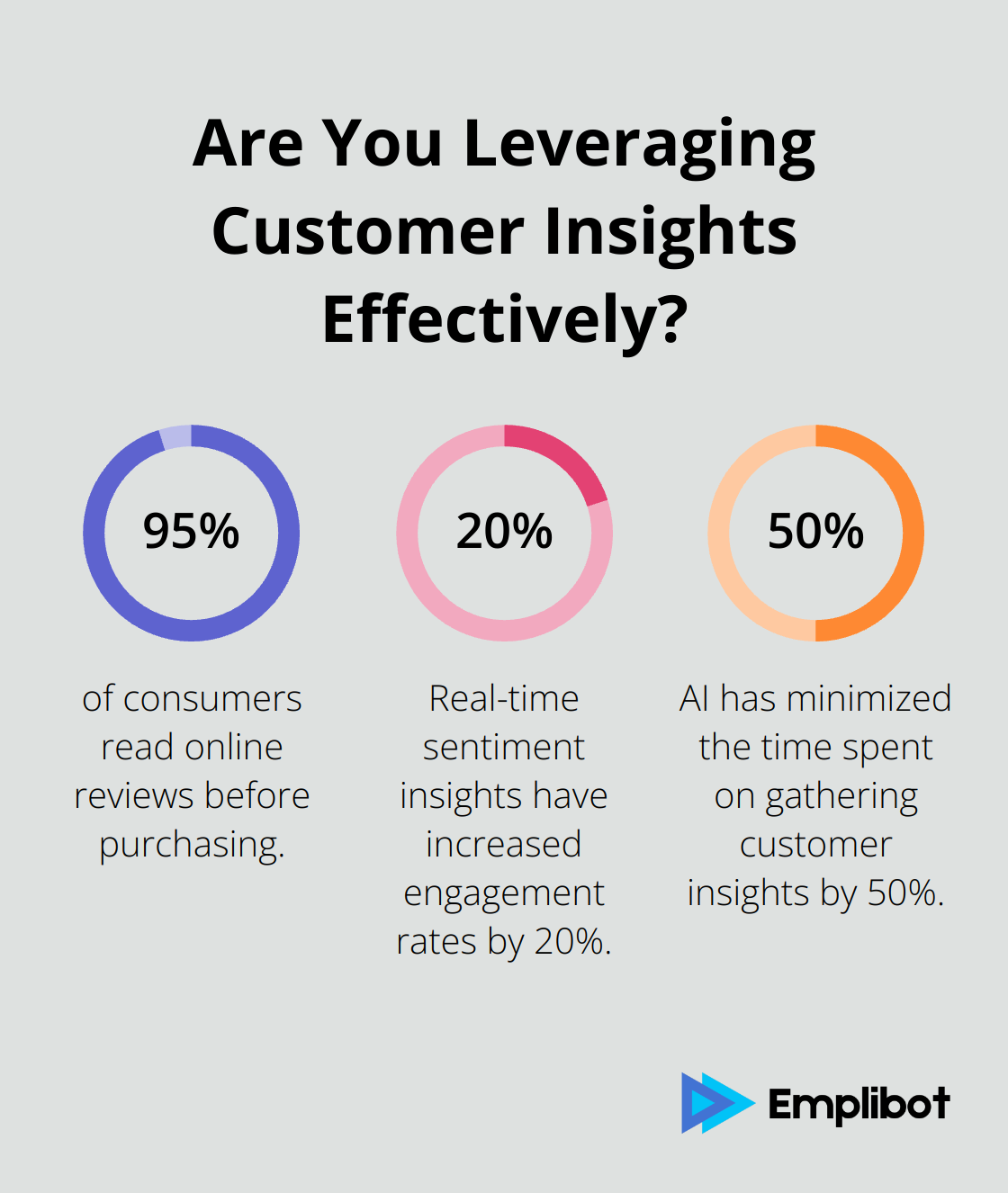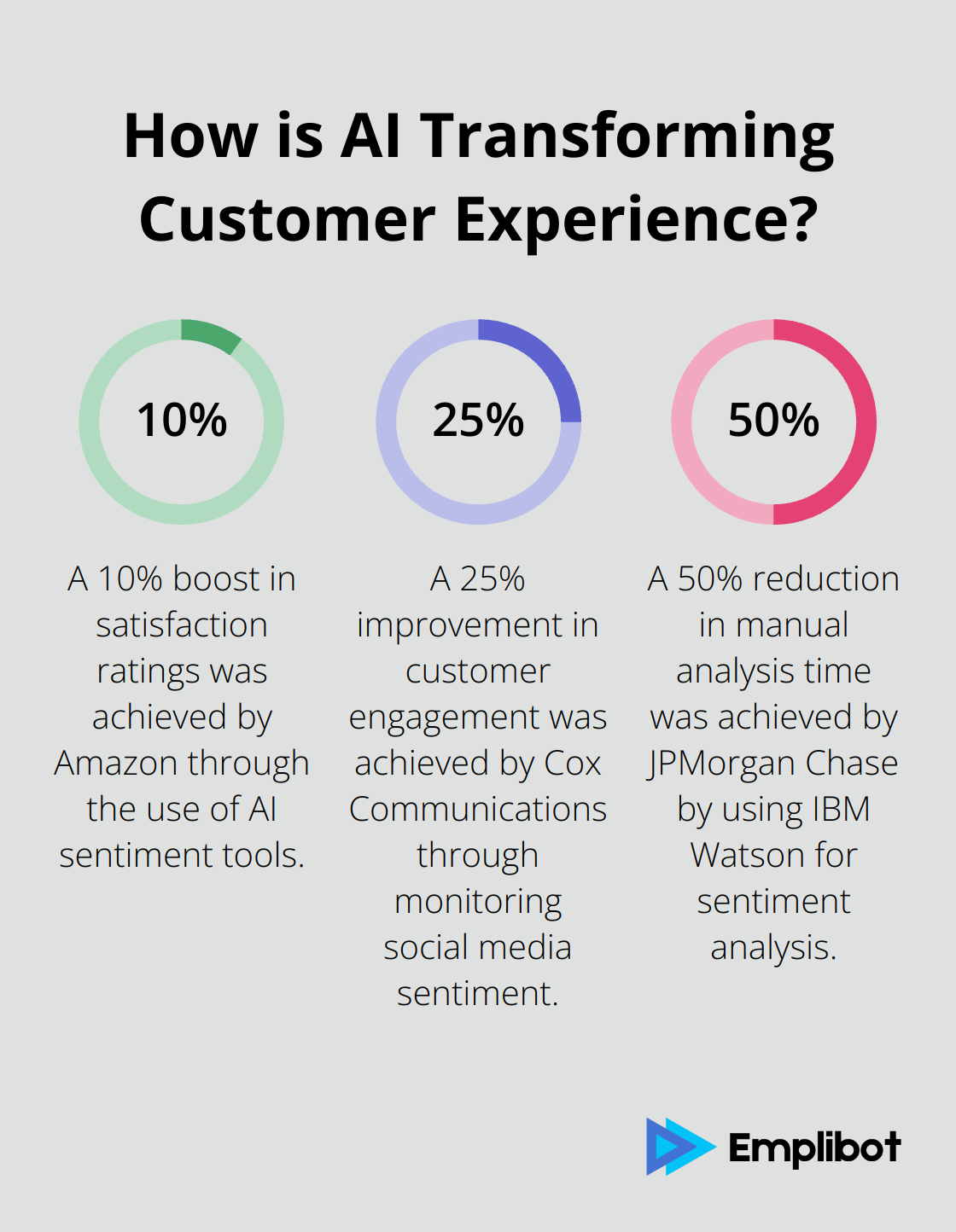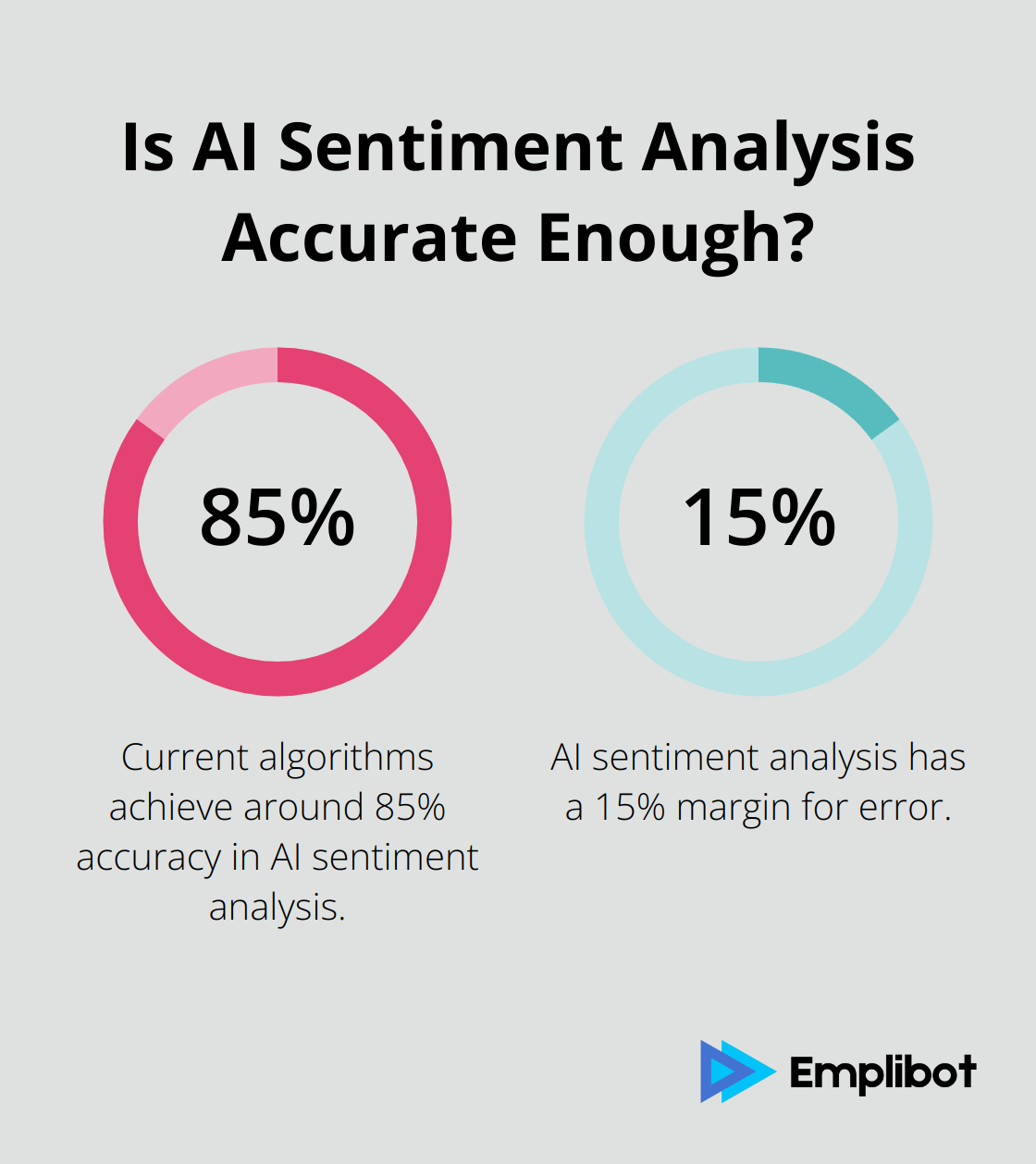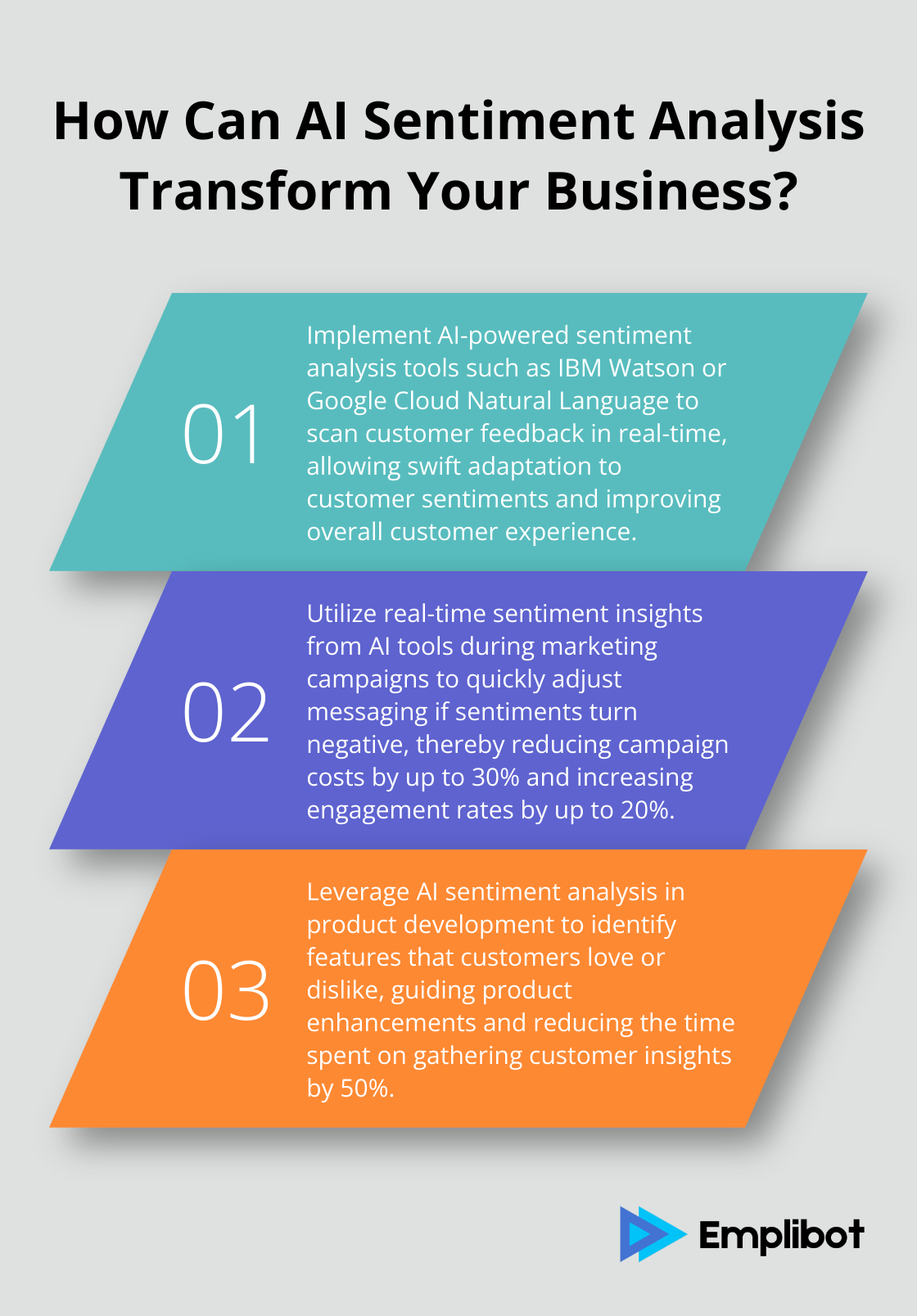Harnessing the power of AI in sentiment analysis is revolutionizing the marketing world. From fine-tuning customer experiences to steering successful marketing campaigns, its applications are vast.
Here at Emplibot, we are committed to exploring these capabilities and sharing insights. Join us as we uncover the practical uses, top tools, and key challenges in AI-powered sentiment analysis for marketing.
Contents
ToggleHow Can AI-Powered Sentiment Analysis Transform Marketing?
AI-powered sentiment analysis offers specific, game-changing applications for marketing. It’s not about theoretical benefits, but real, measurable impacts on customer experience, marketing campaigns, and product development.
Enhancing Customer Experience
In an era where 95% of consumers read online reviews before purchasing, understanding customer sentiments can no longer be optional. AI sentiment analysis scans vast amounts of customer feedback in real-time, identifying emotions such as frustration or satisfaction. Companies like Amazon use AI sentiment tools to prioritize service improvements based on actual customer sentiments, boosting satisfaction ratings by at least 10%.

By continuously refining their algorithms, AI can even detect nuanced emotions, transforming how companies interact with customers. This real-time feedback loop helps brands to be genuinely responsive, resulting in an improved overall customer experience.
Optimizing Marketing Campaigns
Marketing campaigns thrive on timely and relevant insights. AI turned this into a science by offering real-time sentiment insights. For instance, during a campaign, if the sentiment turns negative, marketers can quickly adapt the messaging. This real-time agility has cut campaign costs by up to 30% while increasing engagement rates by 20%.
Predictive analytics paired with sentiment analysis can also forecast how future campaigns might perform. Spotify, for example, uses AI to discern user moods, which informs their marketing strategies for personalized playlists and promotions. This targeted approach results in higher customer engagement and retention.
Improving Product Development
Product development has traditionally depended on some form of feedback, but AI takes it up a notch. Sentiment analysis helps in identifying which features customers love or dislike. Companies like Apple leverage this to focus on enhancements that align with customer needs, driving product evolution. Such data-driven insights lead to more customer-centric products.
To put numbers into perspective, AI has minimized the time spent on gathering customer insights by 50%. This efficiency enables companies to iterate products faster, better responding to market demands.
For practical tips and additional insights on how AI influences marketing strategies, check out our detailed post on how data analytics improves your marketing strategy.
What Are the Best Tools for AI-Powered Sentiment Analysis?
Overview of Popular Tools
AI-powered sentiment analysis tools vary in capabilities. Popular options include IBM Watson and Google Cloud Natural Language. IBM Watson excels in natural language processing, breaking down text into sentiments and keywords. It’s effective for identifying subtle emotions and attitudes. Google Cloud Natural Language provides robust sentiment analysis and entity recognition, making it versatile for diverse text types from reviews to social media posts.
Comparison of Features and Costs
IBM Watson is known for its flexibility and detailed analysis capabilities. It can be integrated into various platforms but comes with a steep learning curve. The cost structure is tiered based on usage, starting at around $0.003 per API call for standard text analysis.

In contrast, Google Cloud Natural Language offers ease of use and quick setup. It’s priced competitively with a free tier for up to 5,000 units per month, while the standard pricing starts at $1.00 per 1,000 units for text analysis. Both tools offer customization options, but Google’s interface is often more user-friendly for smaller teams.
Case Studies of Effective Tool Use
Amazon’s use of AI sentiment tools has set a benchmark. By utilizing tools like IBM Watson, they’ve streamlined customer service operations, achieving a 10% boost in satisfaction ratings. Cox Communications, another example, employed Google Cloud Natural Language to monitor social media sentiment, resulting in a 25% improvement in customer engagement.
These tools have also proven effective in the financial sector. JPMorgan Chase automated their sentiment analysis processes with IBM Watson to detect market movements, reducing manual analysis time by 50%. The healthcare industry isn’t left out either; companies like UnitedHealth Group use AI sentiment analysis to gauge employee satisfaction, making necessary adjustments to enhance workplace conditions.
For more practical tips and insights on how to leverage these tools effectively, read our post on how to analyze social media effectively with AI.
What Are the Challenges of AI Sentiment Analysis?
While AI-powered sentiment analysis is transformative, it brings its own set of challenges. These issues range from accuracy and bias to data privacy concerns and integration with existing systems.
Accuracy and Bias in Sentiment Analysis
AI sentiment analysis is not foolproof. Current algorithms achieve around 85% accuracy, but this means there is still a 15% margin for error. Sarcasm and irony are particularly tough for AI to interpret, often leading to misclassification of sentiments. This is crucial because a misinterpretation can skew your marketing insights and lead to misguided strategies.

Another layer of complexity is bias. AI algorithms learn from data, and if the data is biased, the AI will be too. For instance, a sentiment analysis tool trained on predominantly positive reviews might overemphasize positive feedback in new datasets. To combat this, it’s essential to continuously train AI models on diverse datasets and monitor their outputs for any skewed results.
Data Privacy Concerns
AI sentiment analysis relies heavily on customer data, making data privacy a significant concern. With stringent laws like GDPR and CCPA, companies must responsibly handle data to avoid legal repercussions. Not only is compliance necessary, but maintaining customer trust is also paramount. A breach or misuse of data can quickly erode customer confidence, affecting your brand’s reputation.
Companies utilizing AI for sentiment analysis need robust encryption methods and stringent data policies. Regular audits and transparent data practices can help mitigate privacy risks.
Integration with Existing Marketing Systems
Integrating AI-powered sentiment analysis with existing marketing systems can be daunting. Legacy systems might not be compatible, requiring significant time and resources for integration. Moreover, training marketing teams to effectively use these new tools is another hurdle.
However, the benefits outweigh the challenges. Companies like Google and Spotify have successfully integrated AI sentiment analysis into their systems, allowing them to make data-driven decisions. For those looking to integrate AI tools, starting with a small-scale implementation can be a practical approach. This allows you to test the waters and make necessary adjustments without heavily disrupting your current operations.
For those interested in further insights on the topic, our detailed post on how to integrate marketing automation with CRM systems offers practical tips and recommendations.
Conclusion
AI-powered sentiment analysis has seamlessly integrated into marketing, showcasing its transformative potential. From enhancing customer experiences and optimizing marketing campaigns to refining product development, the tangible benefits are stark. By analyzing heaps of real-time data, companies can make informed decisions that drive growth and customer satisfaction. Tools like IBM Watson and Google Cloud Natural Language have been incredibly effective, as demonstrated by companies like Amazon and JPMorgan Chase.

However, the path isn’t devoid of challenges. Ensuring accuracy and mitigating bias are continual efforts needed to prevent misclassifications. Companies must also navigate data privacy laws carefully, requiring robust encryption and stringent data policies. Integrating AI sentiment analysis with existing systems might appear daunting but is achievable and immensely rewarding.
Looking ahead, we see the adoption of AI sentiment analysis growing, with more companies recognizing its importance. Predictive capabilities and advancements in natural language processing will enhance accuracies and offer even deeper insights into customer behaviors.
For businesses keen on leveraging these tools without the hassle, Emplibot can be indispensable. We publish SEO-friendly articles directly to your WordPress site, automatically handling keyword research, imagery, and internal linking.
To further explore practical applications and strategies, take a look at our detailed posts on AI-powered tools and social media analysis.










 Rated Excellent 4.5
Rated Excellent 4.5